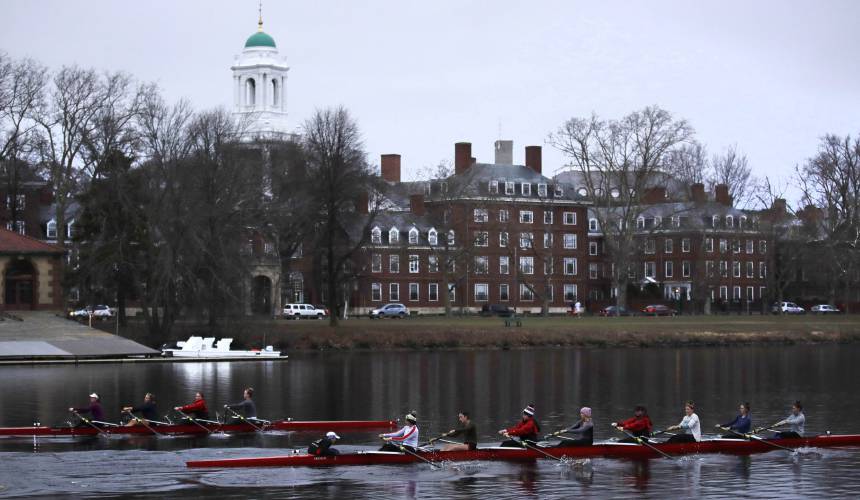Opinion: The value of college education

Rowers pass the campus of Harvard University as they paddle down the Charles River in Cambridge, Mass. Charles KrupaAP
| Published: 09-14-2024 6:30 AM |
John Buttrick writes from his Vermont Folk Rocker in his Concord home, Minds Crossing. He can be reached at johndbuttrick@gmail.com
My father lived with conflicted ideas about education. Without a high school diploma, he attributed his success to self-education and attending a trade school. Yet, in spite of his affirming experience, he was committed to the necessity of a college education for his children. Thus, I became the first in our family to earn a college degree.
The rub was, my degree is in English Language and Literature with a minor in philosophy. It was contrary to the vision my father had for me. He understood the purpose of a college education was to learn technical and cognitive skills that would build a pathway to a lucrative job in science or technology. He never understood how a humanities degree could have any value in the world of capitalism and technical advances.
However, it is understood in my world, that critical thinking, perceptive questioning, adaptable minds, and philosophy / theology are skills that clear the pathway for improving human relationships and the human condition. They are also the skills for discerning ways to become compatible with the ever-changing environment in which humans live and breathe and influence the future.
Today, the value of a college education has become a flash point for discussion and debate, especially in elite schools. The humanities and STEM are not necessarily mutually exclusive choices for college curricula. Colleges may emphasize one or the other, but both approaches are being challenged when they are measured against the cost and the rewards, in money and time, for the student.
Recent Harvard Crimson survey data “suggests that more and more students view college education … (as) an exchange of time and tuition dollars for credentials and social connections more than a site of valuable learning.” Therefore, surveys report, students are giving less and less time to actual studies. “College administrators,” writes professor Eric Baker, “have made it clear that education is no longer their top priority… (for example) even the wealthiest institutions are being taught by an underpaid and overworked contingent of faculty members.”
This contemporary view of the college experience has spilled over into the political arena. If the value of a college education is only about gaining credentials and making connections, some suggest that the government should not subsidize the costs nor forgive student loans. Presidential candidate Trump wants to close the U.S. Department of Education, which would have a negative impact on students and all colleges using federal funds.
Attending college is perceived as only a place where the wealthy elite can make connections to enhance their wealth upon graduation. De-emphasizing the educational aspects of college leaves less affluent students with only the promise of huge college debts and future salaries that cannot pay off those debts. It seems the old debate concerning the results of knowledge acquired by a humanities education or a STEM education has been overridden by the pursuit of money and prestige. Adding in the high cost of college actually reduces its value for those who must accumulate serious debt, difficult or impossible to repay.
Article continues after...
Yesterday's Most Read Articles
 A Webster property was sold for unpaid taxes in 2021. Now, the former owner wants his money back
A Webster property was sold for unpaid taxes in 2021. Now, the former owner wants his money back
 ‘He died loving you’ — Jesse Sullivan sentenced in murder of half-brother Zackary
‘He died loving you’ — Jesse Sullivan sentenced in murder of half-brother Zackary
 Universal EFA program sees 2,000 applications in first week of expansion
Universal EFA program sees 2,000 applications in first week of expansion
 Webster seized and sold his house for back taxes. Now the town has agreed to pay him $38,000
Webster seized and sold his house for back taxes. Now the town has agreed to pay him $38,000
 Company C is closing its Concord store – but the company itself isn’t closing
Company C is closing its Concord store – but the company itself isn’t closing
The opportunity for an authentic college education must be revised. Rather than disparaging the college experience, young people must be offered the opportunity to strengthen their intellectual and creative skills as well as pursue the means to earn a living. College can be a place to explore the workings of great minds of the past from all cultures. College can teach ways to evaluate ideas, philosophies, art, political theory, ethics, and perceived meaning of human existence.
College must be considered one of the pathways to educate leaders for a democratic society. Without a college education, my father taught us some of these skills in discussions of current events around the dinner table. An effective college invites the best thinkers to the dinner table where we learn to be the best citizens contributing to our country and world the best of humanity. Now that is food for thought.







 Opinion: Outlines of a new dystopia
Opinion: Outlines of a new dystopia Opinion: Speechless in America no more
Opinion: Speechless in America no more Opinion: Friends don’t let friends drive drunk
Opinion: Friends don’t let friends drive drunk Opinion: Concord should be run like a household, not a business
Opinion: Concord should be run like a household, not a business
